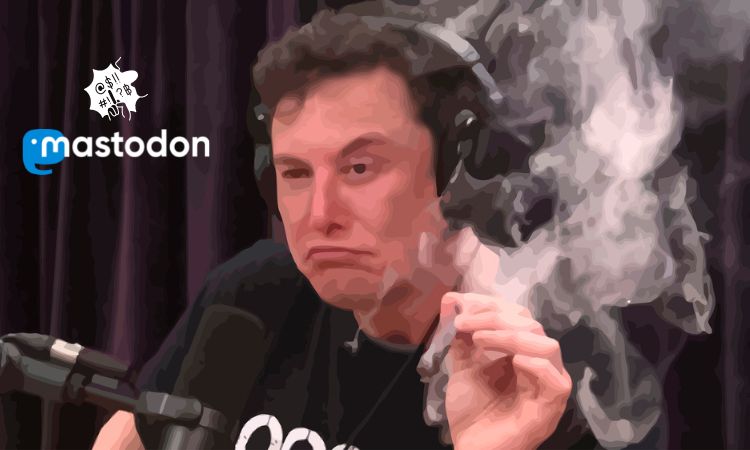
![]()
![]()
Far from the Christmas spirit “silent night, love night”, this week Elon Musk lashed out at everyone Twitter: last Wednesday suspended the @elonjet account, which tracked the location of his private jet in real time; later suspended the account of several journalists North Americans and, the icing on the cake, yesterday afternoon removed Mastodon’s official account, the platform that is emerging as its main competition. For all the decisions, the Tesla owner gave a similar justification: the suspended accounts they violated the rules Twitter.
Twitter policies were “updated” before the suspension of accounts
Yes ok there was no official statementIn a letter to The Verge, Twitter’s head of trust and security, Ella Irwinexplained that a policy update what the company did yesterday prohibit sharing “live location information, including information shared on Twitter directly or links to third-party URLs of travel routes.” And he added: “Without commenting on any specific account, I can confirm that we will suspend any account that violates our policies privacy and put other users at risk.”
The first to fall @elonjetwas owned by Jack Sweeneya 20-year-old college student from Florida, who was monitoring air traffic – public information – to identify the Musk’s private jet movements. The student had created a Twitter bot that tweeted every time Musk’s jet took off and landed at an airport.
The tycoon blocked the account – which already had half a million followers – explaining that “the bot is a direct risk to personal security”. In addition, he doubled the bet by ensuring that he would initiate legal action against the student.
“free speech maximalist”
(this was the Elon jet guy’s personal account) pic.twitter.com/PaixdIgfG7— rat king 🐀 (@MikeIsaac) December 14, 2022
Within a few hours, too the accounts of important American journalists were taken down who had published data on the tycoon’s location: Ryan Mac of The New York Times; CNN’s Donie O’Sullivan; Drew Harwell of The Washington Post; Mashable’s Matt Binder; Micah Lee of The Intercept; Voice of America’s Steve Herman; and freelance journalists Aaron Rupar, Keith Olbermann, and Tony Webster.
Subsequently, in a message on the social network, Musk tweeted: “The same rules doxxing journalists as anyone else”, referring to the Twitter rules that prohibit sharing personal informationcalled doxxing.
In addition, he made a poll popular asking if he should suspend this type of accounts and justified the decision in another tweet assuring that “If someone posted the addresses and locations of New York Times journalists in real time, the FBI would initiate investigations and Joe Biden would give speeches about the end of the democracy”.
If anyone posted real-time locations & addresses of NYT reporters, FBI would be investigating, there’d be hearings on Capitol Hill & Biden would give speeches about end of democracy!
— Elon Musk (@elonmusk) December 16, 2022
As to Mastodon (@joinmastodon)the last account to fall, had 174,600 followers and was suspended yesterday afternoon. Besides, several outgoing links to Mastodon were blockedwhich were rated as “potentially harmful”. According to the TechCrunch medium, a few hours before the blockade, @joinmastodon would have tweeted a link to the profile that the already suspended @elonjet created in Mastodon.
Wow just confirmed Twitter is blocking all links to #mastodon now, presumably over @elonjet kerfuffle. Just unreal pic.twitter.com/RXclAHzGxh
— Evan Greer is on Mastodon (@evan_greer) December 16, 2022
Mastodon gains more and more strength
We will have to wait a few days to see the consequences of this action, but the open source social network is getting stronger and stronger despite Musk’s desperate attempts.
Since the Tesla owner took over Twitter, Mastodon has been adding subscribers to exceed a million. In fact, many Twitter users added a Mastodon profile link in their bios as the platform gained strength. Others directly abandoned the bird’s social network to go permanently to the open source network.
Mastodon was created in 2016 from a project Richard Stallman, GNU Social, a free software microblogging server written in PHP. In this network, a single person cannot set the rules for the entire platform since the servers are separate but open instances of the social network, and are run by people who can set rules. But users can also move to a different server if they don’t agree with those options.
In this sense, the network behaves more democratically than Twitter, contradicting the premises of Elon which, to this day, proclaims itself as a “free speech absolutist”. At least one word of that sentence, we attest that it has been fulfilled.
Photo: Depositphotos
Stay informed of the most relevant news on our Telegram channel




![Consumer spending on shopping apps increased 37% during Q4 2022 [AppsFlyer]](https://www.logitechgamingsoftware.co/wp-content/uploads/2023/07/imagen-2023-07-20T122224.702-336x220.jpg)
